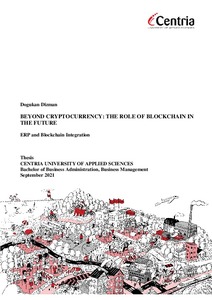Beyond cryptocurrency : The role of Blockchain in the future : ERP and Blockchain Integration
Dizman, Dogukan (2021)
Dizman, Dogukan
2021
All rights reserved. This publication is copyrighted. You may download, display and print it for Your own personal use. Commercial use is prohibited.
Julkaisun pysyvä osoite on
https://urn.fi/URN:NBN:fi:amk-2021092017907
https://urn.fi/URN:NBN:fi:amk-2021092017907
Tiivistelmä
The objective of this thesis was to study blockchain technology in the case of Marmara Chain. This thesis looked at the industry uses of blockchain and analysed the future of blockchain technology. The first objective of this thesis was to tell the reader how blockchain works and why it is important. This thesis also examined enterprise resource planning, how to implement ERP, what the modules of ERP are as well as the advantages and the risks about it. However, the main aim of this thesis was to answer the questions such as whether the integration of blockchain and ERP is possible, what the benefits and challenges of such an integration are.
To answer the research questions, a literature review was conducted. The books and articles were selected from scientific databases such as Google Scholar, Research Gate, Centria E-Library.
Blockchain is a decentralized ledger in which the record of transactions is made. The data on block-chain is unable to be modified, which makes the system secure and suitable for industries such as healthcare, cyber security, voting and banking and payments. On the other hand, enterprise resource planning systems is the core of all business processes in a company: finance, production, HR, supply chain and so on. ERP integrates all business processes in a single system.
The main result of this thesis was that blockchain can address to the challenges of ERP. ERP systems most likely require customization to meet organizational issues. These customizations raise issues and solving these issues is expensive. However, as blockchain with its decentralized ledger offers in-creased visibility and enhanced trust it can address to some challenges of ERP systems.
To answer the research questions, a literature review was conducted. The books and articles were selected from scientific databases such as Google Scholar, Research Gate, Centria E-Library.
Blockchain is a decentralized ledger in which the record of transactions is made. The data on block-chain is unable to be modified, which makes the system secure and suitable for industries such as healthcare, cyber security, voting and banking and payments. On the other hand, enterprise resource planning systems is the core of all business processes in a company: finance, production, HR, supply chain and so on. ERP integrates all business processes in a single system.
The main result of this thesis was that blockchain can address to the challenges of ERP. ERP systems most likely require customization to meet organizational issues. These customizations raise issues and solving these issues is expensive. However, as blockchain with its decentralized ledger offers in-creased visibility and enhanced trust it can address to some challenges of ERP systems.
